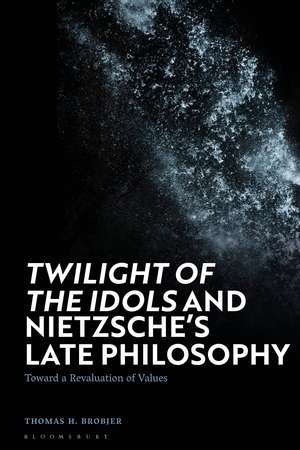'Twilight of the Idols' and Nietzsche’s Late Philosophy: Toward a Revaluation of Values
Autor Thomas H. Brobjeren Limba Engleză Hardback – 28 iun 2023
Preț: 511.14 lei
Preț vechi: 731.62 lei
-30% Nou
Puncte Express: 767
Preț estimativ în valută:
97.81€ • 102.38$ • 81.41£
97.81€ • 102.38$ • 81.41£
Carte tipărită la comandă
Livrare economică 31 martie-14 aprilie
Preluare comenzi: 021 569.72.76
Specificații
ISBN-13: 9781350329409
ISBN-10: 1350329401
Pagini: 264
Dimensiuni: 156 x 234 x 23 mm
Greutate: 0.54 kg
Editura: Bloomsbury Publishing
Colecția Bloomsbury Academic
Locul publicării:London, United Kingdom
ISBN-10: 1350329401
Pagini: 264
Dimensiuni: 156 x 234 x 23 mm
Greutate: 0.54 kg
Editura: Bloomsbury Publishing
Colecția Bloomsbury Academic
Locul publicării:London, United Kingdom
Caracteristici
Detailed commentary on Twilight of the Idols referring to both German and English language scholarship
Notă biografică
Thomas H. Brobjer is Professor of Intellectual History at Uppsala University, Sweden. He has previously published Nietzsche's Ethics of Character (1995), Nietzsche and the 'English': The Influence of British and American Thinking on His Philosophy (2008), Nietzsche's Philosophical Context: An Intellectual Biography (2008) and Nietzsche's 'Ecce Homo' and the Revaluation of All Values (2021).
Cuprins
1. Introduction: The Purpose of Twilight of the Idols 2. How Has Twilight of the Idols Been Read, Understood and Used? 3. The Genesis, Chronology and Composition of Twilight of the Idols and the Revaluation of All Values 4. Sources to and Influences on Twilight of the Idols 5. Reading Twilight of the Idols as Relating to Nietzsche's Revaluation of All Values 5.1 General Consequences and Observations5.2 Title, Subtitle, Foreword and the Aphorisms (Chapter 1)5.3 The Philosophy-Critical Chapters (2, 3 and 4)5.4 The Morality- and Religion-Critical Chapters (6, 5 and 7)5.5 The Old Preface and Its Critique of the Germans and Their Educational System (8)5.6 The Long Chapter on Aesthetics, Writers, Artists, etc (9)5.7 The Last Chapter on Antiquity (10)5.8 The Epilogue5.9 References to the Revaluation of All Values in Twilight of the Idols5.10 Some Conclusions6. What Is Not Included in Twilight of the Idols: Or What Is It a "Summary" of? 7. The Role and Place of Eternal Recurrence in Twilight of the Idols 8. The Role of Psychology, Reason and Instinct in Twilight of the Idols 9. The Critique of Christianity in Twilight, and Its Relation to The Antichrist 10. Conclusion and Summary Appendix: Tables Summarizing Aspects of Twilight of the Idols NotesBibliographyIndex
Recenzii
Brobjer's monograph on Twilight of the Idols is a substantial contribution to the international Nietzsche debate, particularly because the author is able to combine the perspective of philosophy and the perspective of intellectual history. The book is of great relevance for all scholars in the field.
This is a welcome contribution to Nietzsche studies. It provides a much-needed interpretation of Twilight of the Idols and skillfully situates the work within Nietzsche's later writings and his attempt at a revaluation of values.
[T]his is an erudite addition to the literature. Brobjer is multilingual, and he sheds interesting light on often-ignored sources
This is a welcome contribution to Nietzsche studies. It provides a much-needed interpretation of Twilight of the Idols and skillfully situates the work within Nietzsche's later writings and his attempt at a revaluation of values.
[T]his is an erudite addition to the literature. Brobjer is multilingual, and he sheds interesting light on often-ignored sources
